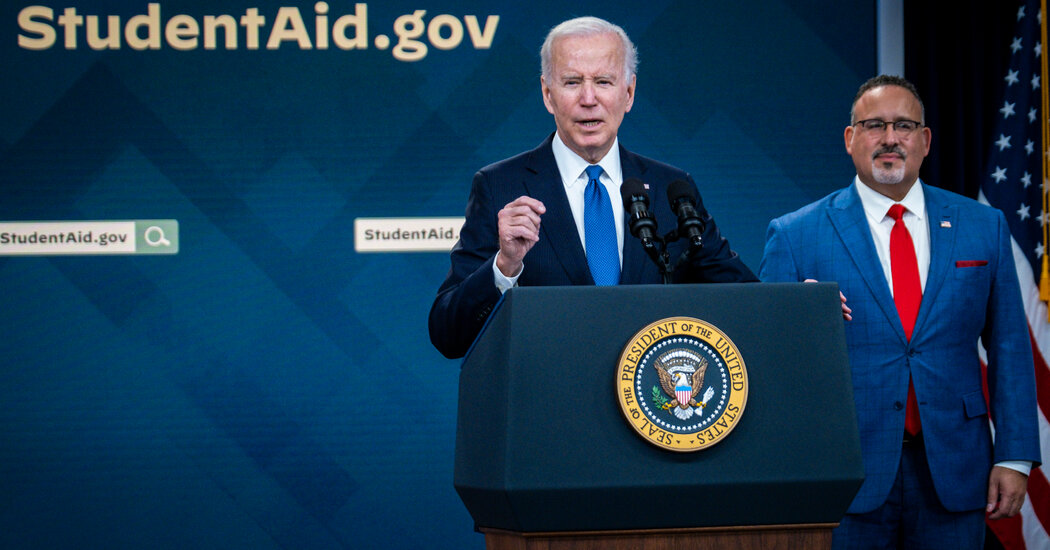A federal judge in Texas on Thursday rejected President Biden’s executive action to forgive hundreds of billions of dollars in student debt, further obscuring the situation for millions of borrowers who have signed up for a program already on hold due to legal hurdles.
“In this country we are not ruled by an all-powerful executive with a pen and a telephone,” Judge Mark Pittman of the United States District Court for the Northern District of Texas wrote in his 26-page decision, siding with the conservative advocacy group that had filed the case.
The law Mr. Biden cited to justify his action — the Heroes Act of 2003, which allows the secretary of education to waive regulations regarding student loans in times of war or national emergencies — does not provide “clear congressional authorization” for the action of the president, Judge Pittman wrote.
The Biden administration said Thursday evening that the Justice Department had appealed the decision, which contradicted the rulings of other district court judges across the country, who had dismissed other plaintiffs’ objections for lack of standing.
“The president and this administration are determined to help working and middle-class Americans get back on their feet, while our adversaries — backed by extreme Republican special interests — sue to prevent millions of Americans from getting much-needed aid.” , said Karine Jean-Luc. Pierre, the White House press secretary, said in a statement.
Mr Biden’s plan had already been shelved after the U.S. Court of Appeals for the Eighth Circuit granted a temporary reprieve last month in response to an appeal filed by six Republican-led states as the appeals court granted their consider requesting a ban on the blocking of debts. cancellation.
Nearly 26 million borrowers have applied for federal student loan debt to disappear under the plan Biden announced in August, and the government has already approved 16 million applications, the president said. said on Twitter last week. But no debt will be forgiven unless the courts allow the Ministry of Education, which owns the loans, to move forward. Ms. Jean-Pierre said the department would keep the applicants’ information “so that it can quickly process their waiver once we win in court.”
It is widely expected that the matter will go to the Supreme Court.
Judge Amy Comey Barrett has, without comment, dismissed two previous objections to Mr Biden’s debt forgiveness plan. Last month she dismissed a lawsuit brought by a Wisconsin taxpayers’ association, and last week she dismissed a complaint from borrowers in Indiana. In both cases, lower courts had previously dismissed the objections.
The Texas case was supported by the Job Creators Network Foundation, a subsidiary of a right-wing small business trade group, on behalf of two federal student loan borrowers. One is not eligible for exemption under Mr. Biden’s plan because its federal loans are not eligible for cancellation. The other did not qualify for the plan’s $20,000 maximum exemption, which was reserved for borrowers who also received Pell grants for low-income families. Their complaint called Mr Biden’s plan “irrational, arbitrary and unfair”.
“This ruling protects the rule of law,” said Elaine Parker, the foundation’s president. “We hope today’s court decision will lay the groundwork for real solutions to the student loan crisis.”
Mr. Biden’s plan would forgive up to $10,000 in debt for those earning less than $125,000 a year and up to $20,000 for those who received Pell grants. It would be one of the costliest executive actions in history, with a price tag estimated by the impartial Congressional Budget Office to be about $400 billion.
Judge Pittman, who was appointed by President Trump in 2019, said the plaintiffs were holding out, partly because they “have a concrete interest in canceling their debts beyond Mr Biden’s plan and would be harmed if it’s going according to plan. And he wrote that the debt cancellation is “an agency action of enormous economic and political significance” and is subject to the “doctrine of the big questions,” a court-created principle that requires Congress to explicitly authorize sweeping actions by government agencies. .
That principle, on which the Supreme Court relied in its recent decision to limit the powers of the Environment Protection Agency, has also been raised by states hearing their cases before the Eighth Circuit Court of Appeals.
Biden has repeatedly criticized attempts to block his student debt forgiveness plan as a partisan attack.
“Republican members of Congress and Republican governors are doing everything they can to deny this relief, even to their own voters,” he said last month. “Their outrage is wrong and it’s hypocritical.”

